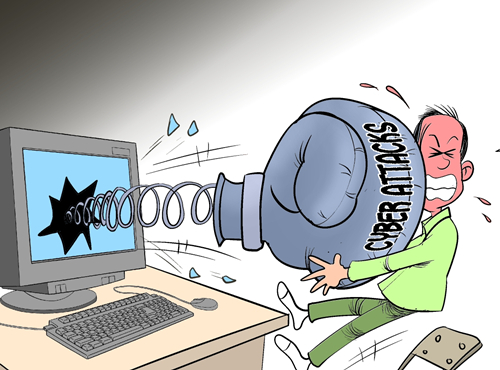China awakens to its vulnerability to cyber attacks from the US
- By Xu Peixi
 0 Comment(s)
0 Comment(s) Print
Print E-mail China.org.cn, March 10, 2014
E-mail China.org.cn, March 10, 2014
The Central Leading Group on Cyber Security and Informatization was formed a week ago in China. The 22-member group consists of 12 core leaders at the central level including Chinese President Xi Jinping and Premier Li Keqiang, and 10 top figures at the ministerial level.
|
An unfair fight [By Jiao Haiyang/China.org.cn] |
On the surface, the formation of such a high level framework is meant to establish central authority over Internet governance, coordinating various ministries on a key issue and abolishing overlapping functions across various ministries. Underneath this surface, however, is a growing sense of insecurity about a rapidly deteriorating environment of Internet governance at the global level. It is an internal action to handle external threats.
The formation of the group shows that China has eventually awakened to what is really at stake in cyber security issues. This sudden enlightenment has arisen from a tough, dramatic and eye-opening debate on the matter with the United States following the brave revelations made by a young Edward Snowden. Two bitter lessons were learnt from the process, and they arguably lead to this state decision for better and coordinated cyber defense.
One lesson is the cyber attacks China has been suffering from the United States. The other lesson is the tough ideological challenge Chinese Internet policy-makers now face. American "digital diplomacy" or "21st century statecraft" coupled with a cyber industrial-military complex has brought about visible damage to Chinese infrastructure on the one hand, and, no matter how absurd it may sound when we consider the massive scale of surveillance the United States carries out on China, the United States has meanwhile presented an ideological challenge, with its sweetly packaged slogans such as Internet freedom and free flow of information.
The statement that the U.S. government has been hacking China for years is supported not only by the widely-known Snowden leaks but also by material evidence. The U.S. State Department once gave 1.5 million dollars to the so-called Global Internet Freedom Consortium, which is directly affiliated with the Falun Gong, a radical group notorious for its hacking of Chinese email and phones, and of China's Xinnuo Satellite, disabling one national TV station and 10 provincial ones. Most recently, an American company, Dynamic Internet Technology, which has close cooperation with the Falun Gong, exercised a massive attack over Chinese websites and disabled two thirds of them.






